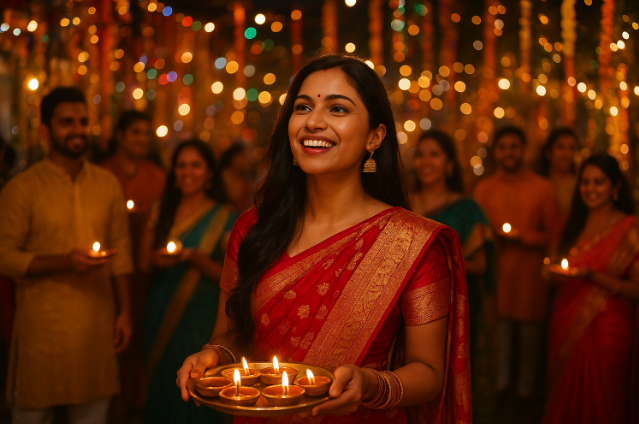
India is one of the richest countries in the world when it comes to culture and tradition, and one of the strongest parts of this richness is the celebration of festivals. These festivals are spread across every month of the year and every part of the land. In India, festivals are not limited to one religion or one community, because people of different faiths live together, and each has their own festivals that add color and joy to life.
In the north, people celebrate Lohri with bonfires and dance. In the east, Durga Puja lights up cities with pandals and devotion. In the south, Pongal is celebrated by worshipping the sun god and thanking nature for the harvest. In the west, Ganesh Chaturthi fills streets with music and devotion. Along with these regional festivals, there are national celebrations like Diwali, Holi, Eid, Christmas, and Raksha Bandhan, which are enjoyed across India with equal happiness and energy. Each festival has its own traditions—Diwali brings lamps and sweets, Holi brings colors and music, Eid brings prayers and feasts, and Christmas brings decorations, gifts, and carols. The beauty of India lies in how people from one religion often join in the celebrations of another, showing true unity. During these days, markets glow with lights, streets come alive with joy, and even strangers greet each other with smiles. Festivals not only spread happiness but also give people a chance to pause, relax, and spend time with family and friends.
Value of Festivals
Festivals are not just about celebration; they hold deep meaning and teach lessons of love, care, and togetherness. Holi, the festival of colors, marks the victory of good over evil and the arrival of spring. On this day, people forgive old grievances, apply colors, and begin anew. Raksha Bandhan strengthens the bond between brothers and sisters, as sisters tie rakhi for protection and brothers promise love and care. Diwali, the festival of lights, symbolizes the victory of light over darkness and hope over fear. Families decorate their homes with diyas, rangolis, and flowers, worship Goddess Lakshmi and Lord Ganesha, and come together in joy.
Other festivals also hold rich meaning. Janmashtami celebrates the birth of Lord Krishna through fasting and bhajans. Ganesh Chaturthi teaches impermanence as idols are immersed after grand celebrations. Eid spreads kindness through prayers, charity, and shared meals. Christmas brings joy through gifts, decorated trees, and the deeper message of love, peace, and harmony. These festivals also bring discipline—families clean homes, prepare special meals, plan gatherings, and manage expenses. At the same time, they keep traditions alive, as children learn rituals from their elders. Every festival carries a deeper message—whether it is forgiveness, protection, kindness, or love—making them essential for balance in life and the preservation of humanity.
The Heart of Our Culture
Festivals are the heartbeat of Indian culture, making this land shine brighter in the eyes of the world. They remind us that life is not only about work or money but about relationships, emotions, and memories that last forever. India is not just a land of food, languages, or traditions—it is a land that celebrates life through festivals. By honoring these celebrations in their true spirit, we preserve our culture and pass its values on to future generations. Festivals are mirrors of our past and pathways to our future. They remind us who we are, where we came from, and how we can remain united in love and harmony.
“Festivals are not just days of celebration, they are the heartbeat of our culture that keeps India alive in spirit and unity.”
